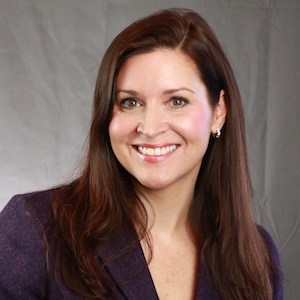 Working in the sports industry makes Heidi Pellerano very visible as a woman.
Working in the sports industry makes Heidi Pellerano very visible as a woman.
But she is able to lean on a philosophy that helps athletes themselves as they strive for success. “I might not be the best athlete, but no one will outwork me,” she says. “You might have to work harder if fewer doors are open, but it’s something I’m proud of.”
Connecting Her Passion to a Career
Many professionals take unusual paths, but that is an understatement to describe Pellerano’s career. She studied as an electrical engineer and worked in the field for three years as a military consultant. But then, she had “that moment” where she was considering that she had a long career ahead of her and wanted to make the most of it. “It was a difficult process and took some soul searching, but making a shift allowed me to be true to myself.”
Although she didn’t come from a typical “sports family,” she’d always been passionate about them and decided to see what paths might open up. As a girls basketball coach at the time, she leaned on some of the parents to help set up informational interviews as she realized it was a tough industry to break into, especially given her background. “I offered to work for free and do whatever it took, but nobody picked me up on my offer,” she says. Through the advice of the parents, she identified an opportunity to earn a master’s degree in sports management at the University of Massachusetts, which would demonstrate she was serious.
During her program, Pellerano became uneasy as she started hearing about the decisive plans her classmates had, and it became clear that even if it wasn’t a long-term goal, she needed something that would differentiate her. It was the 1998 timeframe when women’s sports were growing, and she realized that could be a niche. She specialized all her projects to establish herself, and was approached by a classmate whose dad wanted to bring a WNBA team to Orlando, which opened the door to an internship.
Recognizing it’s an industry that’s all about networking and connections, she focused on meeting other professionals, which paid off when one of the women she had met went to work at the NBA in New York and hired Pellerano. Soon she decided that a marketing degree would complement her skills so she went back to school at Duke University, where she once again was vocal about her goals. A classmate referred her to a small consulting agency in Raleigh, North Carolina, OnSport, which became her entry point to strategic consulting in sports and entertainment.
When the firm was sold to industry giant Wasserman, Pellerano stayed on and just left last year to become Chief Commercial Officer at The Confederation of North, Central America and Caribbean Association Football (Concacaf), one of FIFA’s six continental confederations. She is excited to tell the story of the group’s 60th anniversary next year as the most recent hire of a recently transformed leadership team. “There is a tremendous upside and potential with all the changes that have happened in recent years.”
Making Your Voice Heard
Today when she meets with prospective hires or conducts informational interviews, Pellerano sees potential that others might not. That’s because she had been pigeon holed by her major, without someone to help connect the dots. By doing it herself, she has been able to create the career she wanted, and today can help others with a non-traditional background see where they might fit.
She has realized sports is an industry where it’s easy to be overlooked—one not designed for introverts, meaning she has to make adaptations as one herself. “The extroverts are very comfortable being seen and heard, and I’ve talked to a lot of people about how it’s fine to be introverted, but you have to understand how to shine at the right moments or it can have a limiting effect on your future.”
She acknowledges that as a former military consultant, she has gone from one male-dominated industry to another, and it’s important to focus on developing relationships.
At Wasserman she worked with an HR specialist, who posed an analogy that helped the issue of diversity and inclusion click. “When you look at the network of those in leadership, it will look like people like them, which is how underrepresentation continues,” she says. “Therefore, the best way to increase inclusion is to commit to open doors and advocate for advancement.”
“In many organizations, the biggest hurdle for women and minorities is they feel like they are meeting a quota,” says Pellerano. “If that’s the case, then forget what opened the door and prove them wrong.”
In fact, she exudes what she calls the “boxer mentality.” That means you may wonder how someone can withstand the pain, yet still have that attitude of never giving up. “Someone else has to call them out; it won’t be them,” she says, noting that there are days you wonder whether the struggle is worth it. “You have to realize everything will pay off for the next generations.”
Sports remain a passion in her personal life, and she also enjoys traveling with her family and friends, with favorite destinations being anything outdoors. “Since my job requires me to spend so much time inside, I love to get fresh air, whether it’s mountains, oceans or rivers. A beautiful landscape makes me happy.”
by Cathie Ericson




